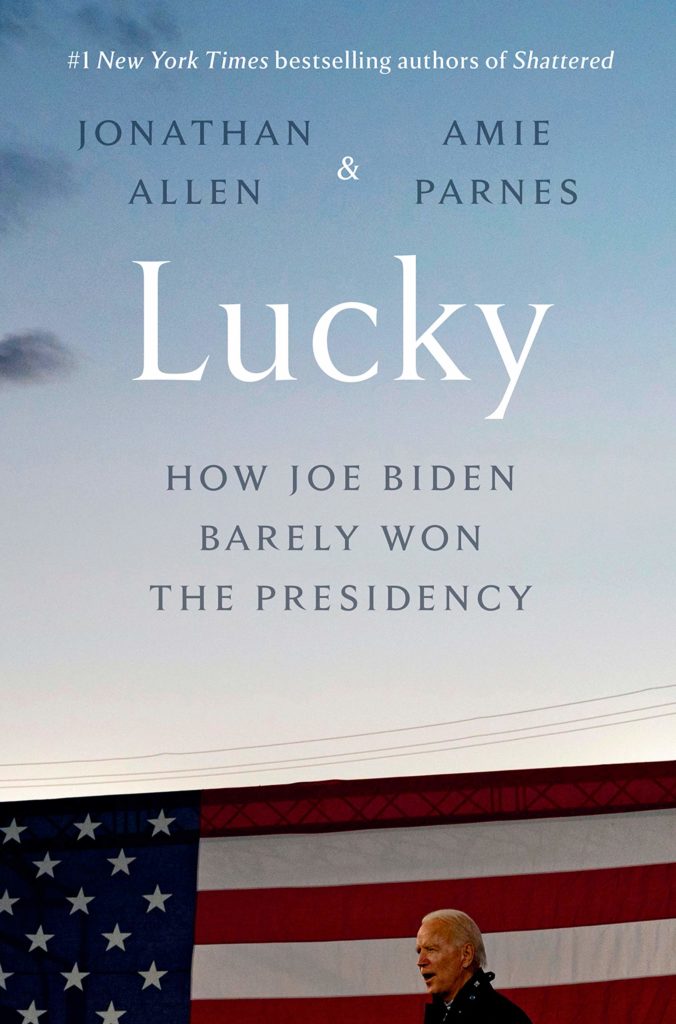Say what you will about Murc’s Law, at least it’s an ethos

Jonathan Allen and Amie Parnes got a lot of attention for their first-past-the-post insider account of the 2016 campaign, which essentially argued that Hillary Clinton lost because she was a bad candidate who ran a bad campaign. This was, to put it mildly, oversimplified, but at least she did really lose a campaign she was expected to win, and even if the causal impact of the flaws in her campaign and candidacy were overstated, this makes them worth consideration.
4 years and a Democratic candidate winning the Electoral College and beating an incumbent president by 7 million votes later, the lesson of their new book is that…Joe Biden was a bad candidate who ran a bad campaign but somehow won anyway:
Sometimes a book is so eager to take readers behind the scenes that it neglects to spend enough time on the scenes themselves. This is often so with works chronicling presidential elections, obsessed as they are with the machinations of high-priced operatives, the strategizing of rival campaigns or the “optics” of who stands where on a debate stage. Read enough of them and it gets hard to discern whether that is all the authors choose to emphasize, or if that is all there really is to see.
Let’s pause to note that the first sentence is a perfect description of an entire mode of journalism.
“Lucky,” a brisk and detailed account of the 2020 presidential race by political journalists Jonathan Allen of NBC News and Amie Parnes of the Hill, is the first volume to tell the story of this unusual electoral contest, with several competing works scheduled later this year and into 2022. Four years ago, Allen and Parnes co-authored the best-selling “Shattered,” an examination of Hillary Clinton’s failed 2016 campaign, in which they placed the blame largely on the ineptitude of the losing side. In this sequel, they are only slightly more generous with the Democratic nominee. Joe Biden won, of course, but mainly because he “caught every imaginable break.” He was the “process-of-elimination candidate,” emerging from a crowded set of more exciting Democratic contenders. He was “lousy in debates and lackluster on the trail,” prevailing despite “a bland message and a blank agenda.” Biden, they argue, got lucky.
Look, as readers of this site are aware having learned nothing from 2016 until early March 2020 I was extremely skeptical of Biden’s chances of winning the nomination despite his consistent lead in the polls, and he wouldn’t have been one of my top 5 choices for the nomination. But at some point you have to wonder why if he was such a poor candidate against so many “exciting” ones he mopped the floor with them despite being notably underfunded on Super Tuesday? Perhaps it’s even possible that what constitutes an effective campaign and what access reporters find interesting are not even fully congruent!
The critical move in all such accounts — granting that it’s rare to see this employed against a winning campaign — is to emphasize structural and contingent factors when they help a candidate, and to ignore or downplay them when they don’t:
The most persuasive case that Biden “barely won” the presidency, as the book’s subtitle states, is found not in the details of Allen and Parnes’s reporting but in their description of the election’s final tallies. Yes, Biden received 81 million votes, the most in U.S. presidential history, but “many voters didn’t realize how close the president had come to winning a second term.” Allen and Parnes note that Trump’s collective margin of defeat in three states that would have given him an electoral college victory — Wisconsin, Georgia and Arizona — was 42,918 votes, less than the 77,000-plus votes that cost Clinton Wisconsin, Michigan and Pennsylvania four years earlier. That is certainly close.
In other words, Biden was a bad candidate who just got lucky because he [checks notes] failed to travel back in time to 1787 and prevent the framers from settling for an instantly obsolete electoral mechanism that make it possible for a candidate to win while getting 7 million fewer votes. OK! Anyway, this is all excellent news for John McCain.


